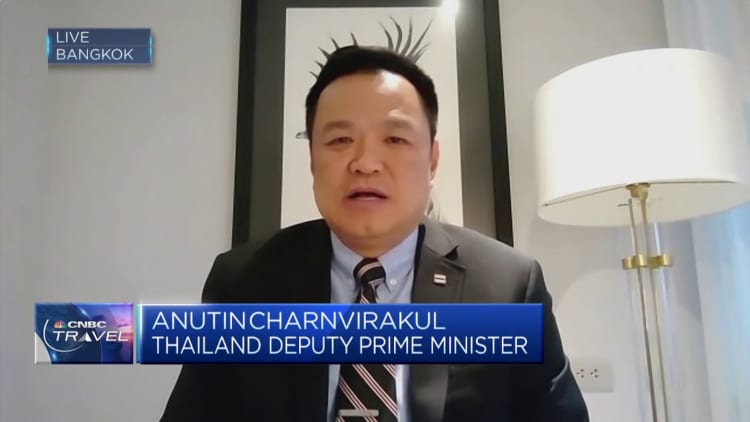[ad_1]
In a survey last year, Chinese travelers said that they were most interested in visiting Europe, Australia, Canada, Japan and South Korea.
But that’s not where they’re going — at least not yet.
Flight restrictions, visa issues and entrance rules aimed only at them are complicating matters for Chinese residents who are ready to travel abroad.
Chinese travelers favored Southeast Asia for trips during the Lunar New Year holidays, which ended in early February, according to Trip.com Group’s Chinese language booking website, Ctrip.
Travel bookings by Chinese residents outside of the mainland grew by 640% from last year’s holiday period — and Bangkok, Singapore, Kuala Lumpur, Chiang Mai, Manila and Bali were the top destinations, according to Ctrip’s data.
Overseas hotel bookings by mainland Chinese travelers quadrupled from last year too, Ctrip said. Yet one place stood out — Bangkok, where “hotels over the holiday increased by more than 33 times,” said Ctrip.
Top spot for tour groups
Thailand is the also the top choice for Chinese tour groups for now, said Thomas Lee, Trip.com Group’s senior director of international business operations.
Ctrip’s first group tour left on Feb. 7, with travelers bound for Bangkok and the nearby beach town of Pattaya, said Lee.
The second-most popular spot for group tours is Maldives, and after that, Egypt, he said.
China resumed group tours organized by travel agencies on Feb. 6. Tours to 20 countries are allowed, including Southeast Asian nations like Thailand, Indonesia, Cambodia, the Philippines, Malaysia, Singapore and Laos, as well as United Arab Emirates, South Africa, Hungary, Cuba and Russia.
Group tours to Japan, South Korea and Vietnam are not permitted yet.
Why Thailand is popular
A major reason Chinese tourists are choosing to go to Thailand is that it’s easy for them to get in, Thailand’s Deputy Prime Minister Anutin Charnvirakul said on “Squawk Box Asia” Monday.
“At the end of the day, we were able to open up our country with very minimum restrictions,” he said.
He said Thailand has tried “all possible ways to make sure that our Chinese tourists, as well as tourists from all over the world, will be able to come to our country to spend their holidays.”
The day after China relaxed its borders in early January, Thailand announced that all incoming visitors must be vaccinated to enter.

But within days, Thai authorities abandoned the rule, amid rising anger from China toward countries imposing new rules on Chinese residents.
Charnvirakul said Thailand’s policy U-turn was related to science, not fears about upsetting Chinese travelers, adding that “more than 75% of our people have [Covid] antibodies both from vaccinations and from being infected.”
He said of the 30 million tourists Thailand is expecting this year, 12 million to 15 million may come from China.
“Chinese tourists have been very vital for our tourism industry,” Charnvirakul said.

The Chinese aren’t the only ones choosing Thailand as a vacation destination.
Russia was Thailand’s seventh-largest tourism market in 2019, but in November 2022, Russian visitors were third in terms of tourism arrivals, after travelers from Malaysia and India, according to Reuters. In late 2022, one in four visitors to Phuket were Russian, said Yuthasak Supasorn, governor of the Tourism Authority of Thailand, according to a Reuters article.
Russians saw their tourism options minimized in 2022, when many countries stopped flying in and out of Russia in the wake of the country’s invasion of Ukraine.
Top concerns
“At present, top concern for customers are issues with visas,” said Trip.com Group’s Lee.
Chinese travelers have been blocked from obtaining visas to places like South Korea and Japan, after both countries stopped processing them over concerns about China’s recent Covid-19 surge. South Korea announced last week it would resume issuing short-term visas to Chinese travelers, according to Reuters.
In other places, Chinese residents face long waits to obtain visas because of high demand. Before the pandemic, visa applications to enter the European Union were processed in a matter of days, but now applicants are facing waiting times of up to two months, according to the website SchengenVisaInfo.com.
Visas aside, Chinese travelers are also worried about getting sick, said Lee.
That’s why group tours are mainly being booked by “Post-90s and Post-80s” travelers, he said, referring to Chinese generational terms for those born during the 1990s and 1980s, respectively.
Price may be no problem
Rising travel prices may be of less concern for some Chinese travelers.
A report published by Morgan Stanley on Feb. 7 shows a growing demand for high-end and luxury hotels among Chinese consumers.
Interest in luxury hotels jumped from 18% to 34% from 2022 to 2023, while “mentions of budget hotels and mid-range hotels fell universally,” according to the report.
More travelers expect their top travel expense to be hotel accommodations too, up from 17% in 2017 to 20% in 2023.
Travelers may have to be willing to open their wallets, even in places like Thailand, which has long been popular with backpackers and budget travelers.
Average hotel booking prices in Bangkok in late January jumped by around 70%, according to Ctrip.
[ad_2]
Source link
